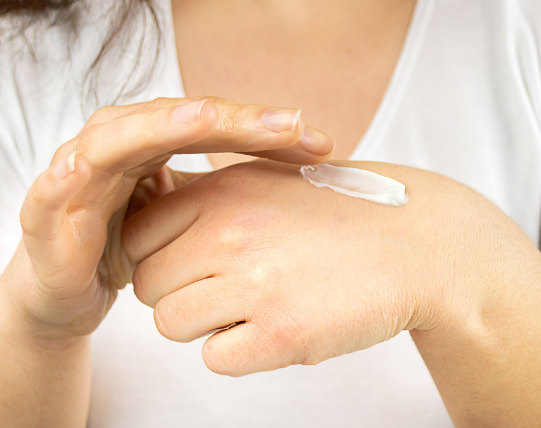Not only are mosquito bites gosh-awful annoying and itchy, but when they heal, they can leave a scar that can stay with you for several weeks.
For those with sensitive skin, the scar can last even longer and might stick around for several months! While prevention is always best — starting with using a good mosquito repellent — sometimes you have no choice but to deal with the bite’s scar. That’s okay, there are several ways to get rid of the irritating scars and get your skin back to its usual vibrant self.
In addition to over-the-counter moisturizers and healing lotions loaded with vitamin E and essential oils, there are a few things you can do after a bite to hasten recovery and reduce the risk of scarring. In this blog post, we’ll look at some of them!
Why Mosquito Bites Leave Scars
Mosquito bite scars happen due to the infection caused by their saliva, which is secreted while they’re biting your skin to draw blood. In their saliva, some anticoagulants and histamines help them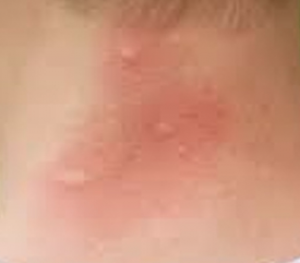 keep the blood flowing nicely while they draw it.
keep the blood flowing nicely while they draw it.
These substances are what trigger a reaction from your immune system and cause inflammation, infection, and allergic reaction that leads to a scar. The scar can range from simple hyperpigmentation or blemish that easily goes away to a permanent keloid scar due to hypersensitivity or infection from scratching and improper treatment of the bite.
Hypersensitivity is usually accompanied by excessive itching, hives, bruises, fever, and difficulty breathing. If you are showing these symptoms, that means you might be allergic to mosquito bites and would be more at risk of having a permanent scar.
You might need to immediately treat these bites to avoid these scars from forming and getting worse. In the next section, we’ll discuss how you can properly treat mosquito bite scars by using medicinal and natural remedies.
How to Get Rid of Mosquito Bite Scars
To get rid of the mosquito bite scars, you need to address two things: The inflammation or reaction to the mosquito bite itself (especially if you are the type whose skin scars easily), and the scratching that might make the scar worse (so you don’t scratch your way to giving yourself a scar). There are several ways for you to get rid of mosquito bite scars, and to lessen the possibility of them happening in the first place.
Treat and Wash the Scar Right Away
One of the ways to ensure the scar gets better is by treating the wound right away before it becomes infected. The CDC recommends you wash the bite location with some soap and water which will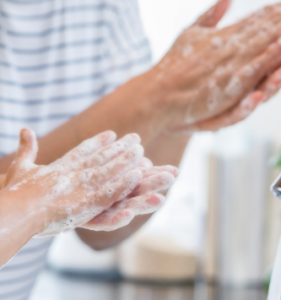 wash away the excess saliva and avoid bacterial infection.
wash away the excess saliva and avoid bacterial infection.
Even if it is super small, a mosquito bite is, in fact, broken skin, and any broken skin can turn in to an infection. While the risk of a mosquito bite getting infected is small, it doesn’t hurt to wash it.
Instead of using a wash bin, you should use flowing water to make sure there’s no cross-contamination after you wash it.
Apply Compress to Avoid Scratching
Scratching your wound or bite location can lead to more severe scarring due to infection and inflammation, so don’t itch your bite, as tempting as it may be! You can divert your attention by applying a hot or cold compress on the scar, so you don’t think about obsessively scratching it.
Applying a cold compress can also help you reduce inflammation overall. Don’t use direct hot or cold compress though, because it can damage your skin. Instead, wrap a towel around the ice and put it on the bite for a cold compress, and leave it on for 10 minutes. For a hot compress, dunk your towel in hot water and wrap it around the bite for 3 to 5 seconds at a time.
Get our favorite compress here on Amazon.
Use Calamine Lotion on the Bite Scar
Calamine lotion is an over-the-counter medication made out of calamine and zinc oxide that is used to get rid of itchiness, pain, and discomfort caused by bug bites, poisonous plants, or chicken pox. 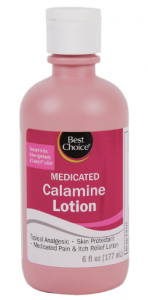
This is another way for you to divert your attention from the itchiness of your bite, and that way, you don’t scratch it and risk further infection. You can use the calamine lotion several times daily and apply it every time you feel an itch coming up on the bug bite. Keep doing that until the sting or bite is gone, which hopefully is in 3 to 7 days.
If you spend a lot of time outdoors, calamine is a good thing to have on hand anyway, as it helps with bee stings, poison ivy and oak scrapes, and other “hard-to-predict” encounters.
Use Hydrocortisone Cream on Your Mosquito Bite Scar
This corticosteroid cream is used to relieve redness, itching, swelling, or other discomforts that are caused by skin allergies. It works by reducing inflammation thanks to the active ingredient, corticosteroids.
Before you use this cream, make sure your hands are clean and apply just a thin layer onto the scar. Then, leave the scar open and unbandaged so it can breathe unless instructed otherwise by your doctor.
Do not use corticosteroids if you suspect that there might be a wound from scratching because this cream is meant for topical use only.
Find hydrocortisone cream here.
Apply or Take Antihistamine
As mentioned before, some of the substances secreted by the mosquito are histamine, which is why you can try counteracting it by using an antihistamine. 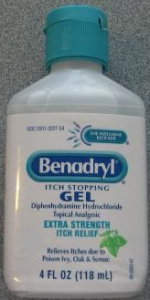
These oral or topical medications are available over the counter and can be bought at most pharmacies. Note that some oral antihistamines make you drowsy, so if you are particularly susceptible, you might want to do a topical application instead.
A good antihistamine will cause you to itch less, which in turn reduces your scratching of the bite. Your own scratching is often more damaging to your skin that the bite itself!
However, if you want to subside the inflammation and itch, oral antihistamines are the best option. It was even found that taking an oral antihistamine before going to areas with lots of mosquitos can lead to less itch and scarring, with bites subsiding after only 24 hours.
We prefer the topical gel from Benadryl. It provides instant cooling to the bite, and not ingesting a medicine reduces one variable of how you might react to it.
Always use any antihistamine exactly as directed by the manufacturer.
Find Benadryl gel here on Amazon.
Make a Baking Soda Paste Ointment (Home Remedy)
If you don’t have any access to antihistamines or a pharmacy, you can try the good ol’ baking soda, which is a versatile compound that should be part of any household pantry! It has the same effects as the calamine lotion we previously mentioned, which is reducing itch and pain associated with bug bites.
You can make this by mixing a tablespoon of baking soda with enough water to make a paste. Make sure it’s not too runny or it won’t dry. Put the paste onto the bite mark, let it dry for 10 minutes, and then wash off the paste with some water. Keep repeating this process until the itch subsides.
Use a Vitamin E-based Lotion Until the Bite Scar is Gone
Although it’s often used to make your skin moisturized, a good lotion that is heavy on Vitamin E can help reduce the scar’s appearance over time. The vitamin E helps your skin heal and be clearer, which reduces the natural blemish that a bite scar can leave. 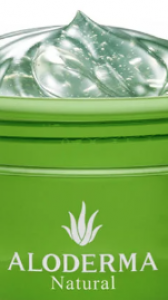
How does it work? There is evidence that Vitamin E, if used 3 times a day, people don’t develop as many keloids — the scar tissue that develops over and around a skin puncture. Some people are prolific keloid producers and are more likely to scar.
Be sure the lotion you use has vitamin E. Then, apply it 1-2 times a day until the scar is gone, meaning you will be using it for several days or even a few weeks.
We like Lubriderm, here on Amazon.
Final Thoughts
Prevention is always better than cure, so if it is skeeter season, you might want to pack your bug spray and apply it diligently every time you head into the bush, or at least have some of those mosquito bracelets with you for outdoor activities. Or, wear mosquito-repelling clothing to help keep them away from your skin. However, try as we might, we still get bitten every now and then.
With these tips, we hope you can minimize the appearance of skeeter bites and keep those pesky scars at bay. Good luck!

